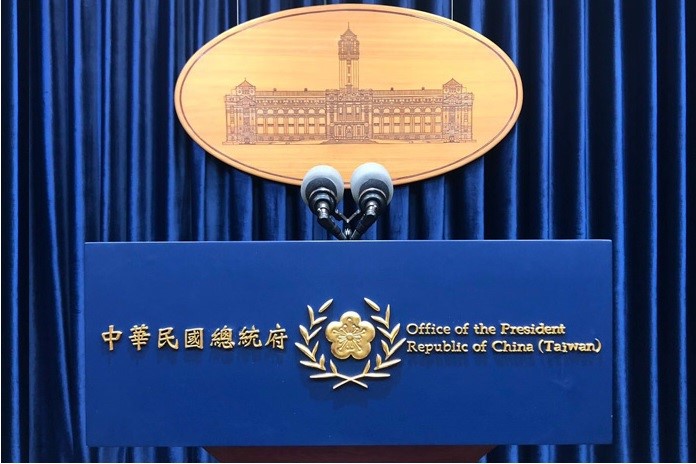News & activities
 News releases
News releases
President Tsai Ing-wen recently sent a letter to Pope Francis of the Catholic Church in response to his message marking the 54th World Day of Peace.
The following is the full text of the president's letter to the pope:
Your Holiness,
It was with great appreciation and admiration that I read your message for the 2021 World Day of Peace entitled "A Culture of Care as a Path to Peace." I identify wholeheartedly with your point of view, particularly at a time when COVID-19 is ravaging the globe, breaking up families, and leaving countless people struggling to make ends meet. Only by overcoming differences in international and interpersonal relations, showing mutual compassion, and working together can we prevail against these formidable challenges.
Due to early deployment by our government and full cooperation from our people, Taiwan is blessed to be among the few countries to have suffered a relatively minor impact from the pandemic. Since the rapid spread of COVID-19 at the start of 2020, we have actively embraced a spirit of compassion and empathy, showing that Taiwan can help as we have shared our successful experience of containing the virus with countries worldwide. We have also donated tens of millions of medical masks and protective clothing to nations in Central and South America, Asia, and the EU, as well as the United States, to meet their urgent need for supplies to fight the pandemic.
Although the pandemic has led to the cancellation of most gatherings and activities around the world, it has not disrupted Taiwan's humanitarian efforts to support the vulnerable. For example, in an inspired response to Your Holiness's most recent encyclical letter Fratelli Tutti, the Republic of China (Taiwan) Embassy to the Holy See celebrated our National Day in October 2020 by serving Taiwanese food to homeless people at Palazzo Migliori and Caritas Rome's Casa Santa Giacinta shelter. The Embassy also distributed eco-blankets in cooperation with a Taiwan-based Buddhist organization, highlighting the significance of fostering a culture of care and interreligious dialogue.
In April 2020, when Italy was suffering grievously from the pandemic, Father Giuseppe Didone of the Order of the Ministers of the Infirm, who has dedicated decades of his life to serving in Taiwan, launched a fundraising campaign for his hometown. To express gratitude for the contributions that the Catholic Church has made to our society and people over the years, Taiwanese citizens young and old lined up to offer donations, raising more than €4.3 million within just six days. Such genuine friendship, which transcends borders, perfectly captured the fraternity that Your Holiness emphasizes in your message.
Your Holiness observed that the pandemic has shown us that all humankind is in the same boat and that no one should be excluded from the global public health network. I fervently agree. And indeed, this is the founding principle of the World Health Organization, as stated clearly in its Constitution. Regrettably, however, the 23 million people of Taiwan have been excluded from the WHO, which has bowed to political pressure and barred Taiwan from participating in the World Health Assembly as an Observer since 2017.
In accord with Your Holiness's insightful views, I believe that exclusion and marginalization are the biggest enemies of a culture of care and the biggest obstacles to the pursuit of peace. International governance should not be pursued according to the law of the jungle, where the strong prey on the weak. Economic strength cannot be used to buy out people's right to seek truth; military might should not become a tool for suppressing human rights and freedom.
Taiwan endured in its history long periods of colonization, war, and authoritarian rule. It was through the blood, sweat, and tears of our forefathers that we built a free and democratic country for all. The Taiwanese people have a common dream of creating a harmonious, inclusive, and mutually beneficial society in which everyone—regardless of ethnicity, gender, or social status—enjoys the freedoms of religion and speech, and where human rights and dignity are safeguarded to the fullest possible extent.
In August 2020, I unveiled the plaque for the newly established National Human Rights Commission, marking another step forward for Taiwan as a nation underpinned by human rights.
Within Taiwan, judicial reforms, well-developed notions of education, and institutional design are enhancing social justice based on a culture of care. At the same time, we are proactively assisting about 550,000 new immigrants to integrate into Taiwanese society. We see immigrants as vital assets infusing Taiwan with life.
Looking outside of Taiwan, I share Your Holiness's staunch belief that universal human rights cannot be compromised. Whenever human rights violations occur across the globe, such as the persecution of the Uyghurs—for whom Your Holiness expresses compassion in your new book Let Us Dream: The Path to a Better Future—and the political pressure targeting Jimmy Lai, founder of Hong Kong-based Next Digital, I have voiced concern in order to let victims of suppression know that they are not alone.
In your World Day of Peace message, Your Holiness cites a passage from the Bible in which Jesus is described as having been sent "to set at liberty those who are oppressed." I earnestly hope that your message will serve as a timely exhortation to those in power, and especially those in authoritarian states, to replace an iron fist with a culture of care, and hostile rhetoric and military intimidation with an inclusive spirit, such that the global peace to which we all aspire will be readily within reach.
Please accept, Your Holiness, the assurances of my highest consideration, as well as my best wishes for your good health as you continue your admirable work.









